|
|
|
Sort Order |
|
|
|
Items / Page
|
|
|
|
|
|
|
| Srl | Item |
| 1 |
ID:
161711


|
|
|
|
|
| Summary/Abstract |
This article investigates some of the institutional and poetic practices around the idea of Hindustani in the period 1900–47. It charts the establishment of the Hindustani Academy in 1927 and explores some of its publishing activities as it attempted to make a positive institutional intervention in the Hindi–Urdu debate and cultural field more broadly. It then considers some aspects of poetic production in literary journals, including those associated with the Academy. Ultimately, it is an attempt to explore the grey areas that existed between Hindi/Hindu and Urdu/Muslim in the pre-Independence decades, and to make the case for studying the literature of both traditions simultaneously, along with emphasizing that attempts at compromise—including the perennially contested term ‘Hindustani’ itself—must be taken on their own terms.
|
|
|
|
|
|
|
|
|
|
|
|
|
|
|
|
| 2 |
ID:
161714
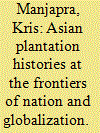

|
|
|
|
|
| Summary/Abstract |
This is a review article of four new books on plantation histories of Asia which offer a sophisticated analysis of the configurations of liberal imperialism, colonial capitalism, and the construction of post-colonial nationalism in the nineteenth and twentieth centuries. The works discussed here are Rana Behal's A hundred years of servitude (2014); Jayeeta Sharma's Empire's garden (2011); Ulbe Bosma's The sugar plantation in India and Indonesia (2013); and Kumari Jayawardena and Rachel Kurian's Class, patriarchy and ethnicity on Sri Lankan plantations (2015).
|
|
|
|
|
|
|
|
|
|
|
|
|
|
|
|
| 3 |
ID:
161703
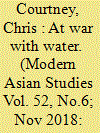

|
|
|
|
|
| Summary/Abstract |
This article offers a critical reappraisal of the Maoist state's response to the 1954 Yangzi floods. It uses a variety of sources, including previously classified government reports and oral history testimony, to challenge the official narrative. It argues that, far from being a remarkable victory for the new government, the flood was a humanitarian catastrophe that caused almost 150,000 deaths. Government hydraulic policies were partly to blame, as the vast majority of disaster victims were located in rural areas that were flooded deliberately in order to protect cities. In addition to revealing the true scale of the flood, this article uses the disaster as a prism to examine the early Maoist state. The government's combative environmental policies turned disaster governance into a war on water. This approach had certain benefits, particularly in terms of organizing an effective urban relief campaign. Unfortunately, campaign politics fostered an atmosphere of distrust, which encouraged many citizens to resist disaster-prevention policies. The example of the 1954 flood reveals the profound impact that a political context can have upon the outcome of a supposedly natural disaster.
|
|
|
|
|
|
|
|
|
|
|
|
|
|
|
|
| 4 |
ID:
161704
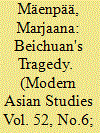

|
|
|
|
|
| Summary/Abstract |
It has been argued that Tan Zuoren's essay ‘Longmen Mountain, please bear witness for the children of Beichuan’ is not only an attempt to narrate an alternative version of the story of the Wenchuan earthquake but also to present a vision of an alternative future for Chinese society. The building blocks for this alternative future would be finding a balance between human beings and nature, respect for minorities, and responsible rule. Tan does not demand the end of Communist Party rule, but explains how the system could be changed to make it better for both the people and nature. The keys to achieving this goal are rectifying historical injustices, an honest examination of mistakes, and respect for ordinary people.
|
|
|
|
|
|
|
|
|
|
|
|
|
|
|
|
| 5 |
ID:
161712


|
|
|
|
|
| Summary/Abstract |
Recent studies of Asian religious traditions have critiqued Western philosophical understandings of mind–body dualism and furthered the productive notion of mind–body continuum. Based on intensive fieldwork among two kinds of devotional groups of Bengal—claimants to an orthodox Vaishnavism, who focus on participating in the erotic sports of the Hindu deity-consort Radha-Krishna in imagination and a quasi-tantric group, which claims to physically apprehend Radha-Krishna's erotic pleasures through direct sexual experience—I demonstrate that, although these devotional groups stress on combating theologies, with emphases respectively on the ‘mind’ and the ‘body’, in their narrations of religious experiences, however, both groups allude to rarefied phenomenological states of cognition and embodiment. So, while influenced by ideas of (mental) ‘purity’ and (bodily) ‘actuality’, respectively, practices of both groups rely on similar states of mind–body continuum. So I argue that the mind–body complex has intensely nuanced articulations in the discursive and experiential domains of these non-Western religious contexts. Through my analyses of the texts and embodiments of these opposed devotional groups, I show that theology gets both organically entangled with as well as challenged by phenomenological experiences. I further argue that explorations in the tenor of religious studies sharply enrich the anthropology of religiosities. Also, such engagements between theology and anthropology have been relatively lacking and need more emphasis in studies of contemporary South Asian religions.
|
|
|
|
|
|
|
|
|
|
|
|
|
|
|
|
| 6 |
ID:
161708
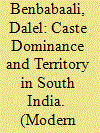

|
|
|
|
|
| Summary/Abstract |
This article argues that taking territory into account is essential to understand the change in the scale and nature of caste dominance in contemporary India. The demonstration is based on an analysis of the socio-spatial trajectories of the Kammas—a dominant caste from Coastal Andhra, where they continue to own most of the land, even though they have migrated in large numbers towards the interior and southern regions of the Indian peninsula, both to newly irrigated areas and to the cities. The key positions they occupy in the politics and economy of Andhra Pradesh confer upon them a hegemonic character. However, this hegemony is threatened by the growing resistance of Dalits to caste and class oppression, while Kamma cultural domination, long contested in Telangana, is now challenged by the formation of the new state.
|
|
|
|
|
|
|
|
|
|
|
|
|
|
|
|
| 7 |
ID:
161710


|
|
|
|
|
| Summary/Abstract |
This article reveals the Charter Act of 1833 as a turning point in the history of British-Indian political thought, which foreclosed, for a generation, liberal efforts to reform Britain's avowedly despotic regime in India. Anticipating a victory in their transmarine campaign to make the state accountable to an Indian ‘public’, reformers were disillusioned to find instead that the new Act was founded on enlightened despotism. Attempting to gather popular support for the authoritarian vision of reform espoused by Thomas Babington Macaulay and the other framers of the Act, Governor-General William Bentinck organized a grand fireworks display in Calcutta. The failure of this event, however, compounded the initial backlash against the Act, widening the rift between state and ‘public’, and precipitating the latter's decline as an effective political formation.
|
|
|
|
|
|
|
|
|
|
|
|
|
|
|
|
| 8 |
ID:
161707
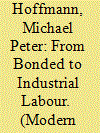

|
|
|
|
|
| Summary/Abstract |
This article focuses on how people who formerly worked as bonded labourers adapt to the new realities of an insecure capitalist labour market. It examines how the past shapes the uncertain labour situation of the present, including resistance. The article reflects on the current experiences of precarious labour at industrial sites in western Nepal. It describes how former bonded labourers and their descendants have begun working as contract workers in a modern industrial food-processing factory, with the help of contractors related to them by kin. The article further shows that one of the defining features of their new life as contract labourers is its chronic precariousness. Undisguised forms of confrontation, such as open disregard for management instructions, are also part of their new reality in the labour market. Contract labourers are often strongly assertive in the face of managerial authority, and this assertiveness has been shaped largely by either past experiences or memories of bonded labour. The article contributes to debates about bonded labour and its transformations in South Asia. It also offers a reflection on the limited impact of the Nepali Maoist Revolution on precarious labour and on the ethnic dimensions of this segment of Nepali society. Finally, it contributes to discussions about industrialization and Adivasi communities in South Asia and beyond.
|
|
|
|
|
|
|
|
|
|
|
|
|
|
|
|
| 9 |
ID:
161713


|
|
|
|
|
| Summary/Abstract |
This article revisits the issue of the offshore islands in the Taiwan Strait during the Cold War. Benefitting from archival materials only recently made available, specifically Chiang Kai-shek's personal diaries, CIA declassified materials, Taiwanese Foreign Ministry files, and rare publications from the Contemporary Taiwan Collection at the Library of the Institute of Oriental Culture, University of Tokyo, this research examines the cloud of suspicion surrounding the secret contacts between Taipei and Beijing leading up to and during the 1958 offshore islands crisis, elucidating how such a political tête-à-tête, and the resultant tacit consensus over the status of the islands, gradually brought about an end to the conflict between Taiwan and Communist China. In hindsight, the crises over the offshore islands along China's southeast coast momentarily brought the United States closer to war with Communist China, while putting the relationship between Taipei and Washington to a serious test. The end result, however, was that, while these isles were technically embedded in the unfinished civil war between the Chinese Nationalists and Communists, they provided, ironically, an opportunity for secret communications and, ultimately, a kind of détente between the two supposedly deadly enemies across the Taiwan Strait. A close examination of the details of these crises, along with their attendant military, political, and diplomatic complexities, reveals an amazing amount of political intrigue at both the local and international levels that has not been fully realized until now.
|
|
|
|
|
|
|
|
|
|
|
|
|
|
|
|
| 10 |
ID:
161709


|
|
|
|
|
| Summary/Abstract |
This article studies the extraordinarily broad advocacy of military enlistment by India's political and intellectual elites during the First World War. Though often interpreted as politically motivated, it shows above all a preoccupation with the enlivening effects of military experience—in particular its development of courage and manliness. In this it followed an established pattern of Indian elite concern with martiality. It also reflected anxieties of Indian weakness and effeminacy—something elites indicted themselves for, but which, importantly, they assumed to be more generally prevalent. Sampling calls for enlistment in the public space throughout the war, the article focuses on Bombay Presidency—a region that gave rise to such prominent Indian voices for enlistment as M. K. Gandhi, B. G. Tilak, and M. A. Jinnah. Bombay's recent experience of relative exclusion from military recruitment, and from membership of the ‘martial races’, was representative of much of India. This article enables us to view the effects of such ‘demartialization’ away from the classic case of Bengal. It suggests that it helped to inspire the call to enlist, especially as public spokesmen for the ‘martial race’ ideology explicitly linked martiality with manliness. The concern for enlistment ultimately superseded political calculation even for so hard-nosed a politician as Tilak. And though elites were most obviously concerned for their own martial vigour and leadership, they were also concerned with the manliness of the bulk of India's population, especially in Gandhi's conception of war as a preparation for satyagraha.
|
|
|
|
|
|
|
|
|
|
|
|
|
|
|
|
| 11 |
ID:
161705


|
|
|
|
|
| Summary/Abstract |
This article considers the relationship between poverty in Rangoon and the ways in which both an imperial and a post-imperial urbanism helped ‘improve’, develop, and reclaim Rangoon's urban environment. Examining the actions of the Rangoon Development Trust before and after the Second World War in the context of actions taken by the Bombay Improvement Trust, Bombay Development Directorate, Singapore Improvement Trust, and Hong Kong Housing Authority, it both analyses measures taken in Rangoon and constructs a connective history of urban development in relation to other Asian port cities. Incorporating documents released only in 2014 by the National Archives of Myanmar, this analysis for the first time considers interventions made in Rangoon's post-war built environment of poverty, connecting these actions to policies constructed over the preceding decades.
|
|
|
|
|
|
|
|
|
|
|
|
|
|
|
|
| 12 |
ID:
161706


|
|
|
|
|
| Summary/Abstract |
Conjunctures of globalization and education have shaped the intersection of Buddhist monasticism and international tourism in the Northern Thai city, Chiang Mai. International tourism in Chiang Mai has been popular since the 1990s, while monks from all over Thailand and South and Southeast Asia have come to Chiang Mai in large numbers to pursue higher education in English since the 2000s. Focusing on Buddhist temples that contain a Monk Chat programme, where tourists and monks engage in conversation, this article analyses the responses of Buddhist monks towards a range of international tourists. Utilizing the perspectives of Buddhist monks through interviews reveals attitudes towards Western and Asian tourists as situated within broader discourses of Thai society. Investigating these attitudes and responses within the context of wider state, regional, and transnational influences, I argue that attitudes towards religious others are inextricably connected to missionization.
|
|
|
|
|
|
|
|
|
|
|
|
|
|
|
|
|
|
|
|
|